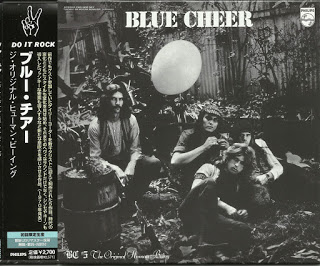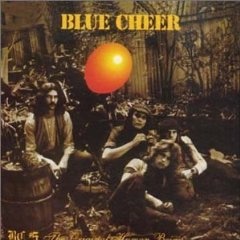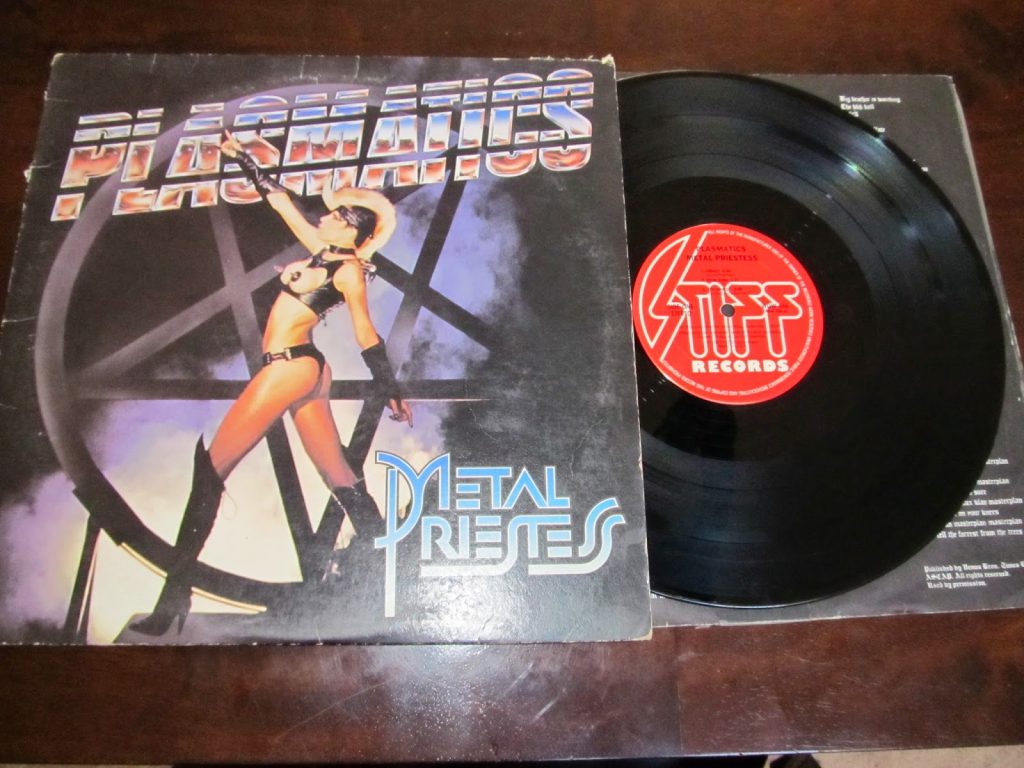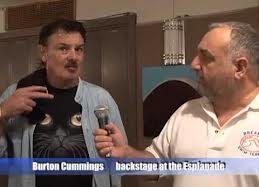
The Original Human Being opens with the driving “Good Times Are So Hard
to Find,” a West Coast version of the Spencer Davis Group’s “I’m a Man”
that generously lifts from that classic Jimmy Miller/Steve
Winwood/Spencer Davis composition. Founding member Dickie Petersen is
augmented by horns, of all things, on the blues-pop “Love of a Woman.”
Blue Cheer sounding like Traffic and Tower of Power in two fell swoops
is not what the menacing cover photo would indicate. Indeed, you can’t
tell a book by its cover. Logically, Blue Cheer should have taught Black
Sabbath a thing or two, but the band heads more in the direction of
Ozzie’s Magic Lantern with its singsong hit “Shame Shame” than the
grunge of guitarist Tony Iommi. Titles like “Preacher” and “Black Sun”
may be better suited for Sabbath, but for fans of this ultra-cult band
from the ’60s,
The Original Human Being is a vast improvement over the band’s third
outing, New! Improved! Blue Cheer. Keyboard player Ralph Kellogg’s “Make
Me Laugh” sounds strained in the vocal department, but the band has its
act together and the song works. Blue Cheer is so “on” that everything
works here, including the instrumental and sole songwriting contribution
by drummer/sitar player Norman Mayell. It is the sleeper surprise on
this disc. How many listeners wanted to like George Harrison’s “The
Inner Light”? “Babaji (Twilight Raga” is the blending of Ravi Shankar
with pop that the Beatles sought but never found. Hidden here, the last
track on side one of a Blue Cheer disc, is that magic formula. Really
creative and fun stuff. “Pilot,” the first of guitarist Gary Yoder’s
five co-writes with G.R. Grelecki, is innovative, cosmic, intellectual
— just well-threaded rock ‘n’ roll.
Blue Cheer was not adverse to changing membership on a frequent basis
and trying different formats. If the lyrics on “Pilot” are deficient,
the music is distinct and original…truly “the original human being.”
Close to 46 minutes of music is a healthy 20-plus minutes per side, and
where side one of New! Improved! Blue Cheer fell flat, just two discs
later we find this album full of revelations. Of course, Petersen is the
only holdover from the first two albums to appear on The Original Human
Being, which says a lot about the experimentation of lineups. Blue
Cheer was a musical version of a baseball team with players coming and
going. Still, the groove of “Preacher” has sax weaving in and out,
pre-Roxy Music and just as entertaining and enlightening.
The production by Gary Yoder, Eric Albronda, and Norman Mayell is really
fine. “Tears By My Bed” could be the Band, showing a complete shift in
Peterson’s musical accomplices, crafting a series of albums worthy of
study. The Original Human Being and Oh Pleasant Hope are the culmination
of serious efforts by Dickie Peterson. The folksy guitar riff coupled
with Yoder’s harp on “Man on the Run” makes for real ’60s period-piece
paranoia, perfect for an episode of Route 66 or The Man From U.N.C.L.E.
This album is also a good argument for modern rock radio adding classic
songs that never got airplay the first time around. “Man on the Run” is
everything so-called “modern rock” bands aspire to be. Two more
Yoder/Grelecki compositions, the funky/sensual “Sandwich” and “Rest at
Ease,” conclude this excellent portion of San Francisco rock, “Rest at
Ease” with a descending fadeout that shows the band at the peak of its
powers.
by Joe Viglione
Metal Priestess, The Plasmatics
This six song EP is even shorter when any {$Plasmatics} fan realizes
that the four new songs recorded by Svengali manager {$Rod Swenson} and
producer/engineer {$Dan Hartman} are augmented by live versions of two
songs from the previous 1981 release {^Beyond The Valley Of 1984}.
Guitarists {$Richie Stotts} and {$Wes Beech} set a solid crunchy tone
behind {$Wendy O} with
two new drummers – {$Tony Petri} on the two live tracks, {&”Masterplan”}
and {&”Sex Junkie”}, and {$Joey Reese} on the studio material. Keep in
mind that’s four drummers in the two year span between {$Stu Deutsch} on
{^New Hope For The Wretched} and {$Alice Cooper} drummer {$Neal Smith}
on the studio material on {^Beyond The Valley Of 1984} (that 1981
album’s two tracks recorded live in Milan don’t identify if the drummer
is one of the four – and if you add the drummer from the {@Capitol
Records} debut in 1982, the {^Coup D’etat} album, it brings that total
to five). {$Chris “Junior” Romanelli} replaces {$Jean
Beauvoir} whose image and musicianship was pretty irreplaceable. Still,
{$Dan Hartman} does a great job of capturing a solid hard rock sound and
{$Wendy O} is truly significant as a more than competent metal
vocalist. It’s a transition
from the previous attempts at punk and smart reinvention. {$Beauvoir}
would come back five years later with his excellent solo project {^Drums
Along The Mohawk} followed two years later by {^Jacknifed}. His presence
and musicianship could have added to these four studio sides, though
they hold up well on their own. There’s not much difference between
{$Wendy’s} snarling on doomsday song {&”12 Noon”} or {&”Doom Song”},
which is yet another doomsday song, this one with {$Richie Stotts}
brilliant slashing guitar lines. The metal arena gives {$Stotts} a
chance to shine, and he is an underrated talent, as was {$Wendy O}. The
combined energies of these individuals always took a back seat to
{$Swenson’s} imagery and public relations. The material by {$Stotts} and
{$Beech} is fun and fits the bill, though a separate live album would
have been preferable to the cutting and pasting.
Still, {^Metal Priestess} holds up and is a worthwhile addition to the
small but influential {$Plasmatics} output. It was later combined
on CD with its sister release from 1981 {^Beyond The Valley of 1984} .
https://jvmiscellaneous.blogspot.com/

BLUE CHEER LIVE IN BROOKLINE MASSACHUSETTS APRIL 8, 2007!
BLUE CHEER ON EASTER SUNDAY, GREAT SCOTT
Vincebus Eruptum is the title of the album that spawned Blue Cheer’s Top 40 hit, a cover of Eddie Cochran’s “Summertime Blues”
in the Spring of 1968. Four decades later the sound from that album
shook the rafters at Great Scott’s in Allston to an audience of
appreciative psychedelic blues
rockers. There were many parallels to the Iggy and the Stooges
show the night before – bassist/vocalist Dickie Peterson’s skull and
crossbones on his amp (which Iggy and The Stooges had as their backdrop
onstage), a cross generational audience of twenty-somethings and grey
hairs, and the same low tone emanating from the stage. As they plowed
into their third
selection, a cover of B.B. King’s “Rock Me Baby” that sounded less like King and more like…a heavy metal thunder,
the Hendrixian guitar sounds of guitarist Andrew “Duck” MacDonald kept
the music on an esoteric level the audience could relate to a bit more
than the pedestrian hardcore
opening acts. Two of the openers sounded
like they were trying to be hardcore rather than taking it in a new
direction. Their redundant copying of an overplayed genre was a stark
contrast to Blue Cheer’s glorious paean to yesteryear.
For a band
with such an eclectic catalog, they stuck to the basics, material from
the first hit album. Pianist Mose Allison’s “Parchment Farm” became
psychedelic sludge with Peterson noting that “we picked a lot of our
music from a lot of different places” and that Allison might not
appreciate how they put their stamp on the song. Albert King’s “The Hunter” from their second album, Outsideinside, had that low thud exploding into Space Age Blues. As Vincent Jeffries on AllMusic.com
noted in his review of Outsideinside it “ranks among the most
underappreciated hard rock collections ever” and “was released a full
year before either the Stooges’ debut or MC5’s Kick Out the Jams.” Though this critic would’ve appreciated the group dipping into their Bob
Dylan/The Band-styled musings which would happen by 1970’s “The Original Human Being”,
or putting their pristine Pink Floyd-ish chestnut, “I’m The Light”,
from the album Oh! Pleasant Hope, in the middle of the set to bring some
balance, these tried and true veterans were happy to blast away with
the trademark original sound that launched a thousand ear plugs.
With The Linwood closing on this weekend and The Kirkland in Somerville about to close on May 31 Great Scott might be the little room to fill the void. https://rockjournalistjoevig.blogspot.com/2011/

